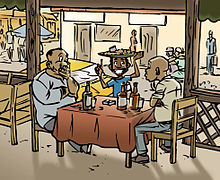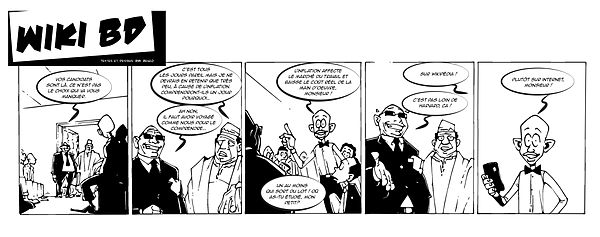Grants:IEG/What is about - C'est quoi. A series of communication tools about Wikipedia. Cameroon pilot project/Midpoint
![]() This project is funded by an Individual Engagement Grant
This project is funded by an Individual Engagement Grant
Welcome to this project's midpoint report! This report shares progress and learnings from the Individual Engagement Grantee's first 3 months.
Summary[edit]
We concluded the pre-production phase and we are currently producing.
Methods and activities[edit]
Our project produces site-specific communication tools which interpret the core vision of Wikipedia for a public who does not know what Wikipedia is about. The tools are conceived by video makers, designers and artists, and they are curated by cultural institutions based in specific countries. More specifically our project is a pilot and it focuses on Cameroon.
How have you setup your project, and what work has been completed so far?
- Meeting with the team, checking the details of the proposal and the working direction, deciding to focus on Douala, definition of the communication strategy and the tools which will be used and for which target.
- Preproduction. Hypothesis of concepts, selection of more details concepts and scripts, transformation of the concepts and scripts into production costs, team and locations. Involvement of the relevant people, actors and artists. Selection of the concepts and validation.
- Start of the production.
Describe how you've setup your experiment or pilot, sharing your key focuses so far and including links to any background research or past learning that has guided your decisions. List and describe the activities you've undertaken as part of your project to this point.
- Meeting in person (Douala, December 2013). This was essential to get the project set.
- Definition of a drat timeline with the list of things to do and an hypothesis of what to do when. We used the timeline project page.
- Leaving the lead locally. doual'art have experience in commissioning artworks and in working with artists. Trying to follow the development of a video and the production of comics on distance doesn't seem to work; this is due to the complexity on distance to take decisions, discussing hypothesis and making changes: everything becomes very long and dispersive; it is complexity different than being there and just meet to review the work and how it can be developed further.
Midpoint outcomes[edit]

What are the results of your project or any experiments you’ve worked on so far?
- Team
- Concepts for the videos and comics. Scripts for the videos. Below a summery of the concepts in English.
Concepts for the video[edit]


WIKI C KOI? (shorten of “Wikipedia c’est quoi?” - What is about?)
The video wants to be as far as possible from cooperation for development campaigns. It doesn't want to tell people "how good Wikipedia is for you" but rather surprising and intriguing in a short and fast way.
CKOI (selected)[edit]
Vox pop on “Wikipedia, what is about” in a street of Douala. Here a video to get a sense of the streets of Douala; it is by Sadrake a very well know singer of Douala.
Each person interviewed gives a strange answer; after few images that represents the strange answer, packshot: Wikipedia is the online encyclopedia, to share knowledge freely across the globe (in French “Wikipedia, c’est l’encyclopedie en ligne, pour partager le savoir gratuitement a travers tout le globe”). Payoff: ça va se savoir - you will know about it.
The strange answers are (currently selected):
- A disease (in French “Weee, ... j’ai déjà suivi ça, je crois que c’es la maladie, la”)
- A dance
- A singer of Rhythm and blues
- A telenovela
- A film of science fiction
Waka Wiki[edit]
Waka in Douala is the word used for prostitutes.
A big care moves slowly in a Douala street by night. "How much?" – asks the driver to a prostitute from the window. The prostitute gives her price (in French it would sound like “c’est 3000 bébé”). The car moves on. Another prostitute "How much?" and another price. Until the car passes in front of a Wikipedian. "How much?" – asks the driver. "Well, actually is free”. Packshot: "Wikipedia. The collaborative online encyclopedia, useful multilingual and free" (in French “Wikipedia, c’est l’encyclopédie collective en ligne, pratique multiline et gratuite!)
Wikisdom[edit]
An almost empty African village. Under the palabre tree (the traditional meeting point of the community), an old wise man is finishing talking in front of a group of attentive people; among them some tourists fascinating by his ancient wisdom. People ask questions and the old man answers “tomorrow”. You then see him in his room checking the answers on Wikipedia. Voiceover: Some things never change. Wikipedia is the online encyclopedia, useful, practical and free. Because knowledge is valuable only when it is shared (In French “Certaines choses/ ne changent jamais. Wikipedia, c’est l’encyclopedie en ligne/Utile, pratique et gratuite/Car le savoir ne vaut que s’il est partagé).

Concepts for the comics[edit]


The comics have an explicative role. Since the video is meant to be short, fast, surprising and intriguing, the comics want to provide audience with a more narrative portrait of how Wikipedia can be used and why it can be relevant to them. Please discuss anything you have created or changed (organized, built, grown, etc) as a result of your project to date.
I have heard that (in French Les "on dit" de Wikipédia)[edit]
People are discussing an issue. Gossips, stories and facts are all mixed-up and people say all the time "I have heard that..." (in French "on dit"). Someone appears out of the blue in the conversation to put things back in their context, showing how Wikipedia can be useful.
Wikipapa[edit]
Wikipapa is a sort of doctor of complicated words (in French "guérisseur des mots"); his secret weapon is Wikipedia.
Finances[edit]
Please take some time to update the table in your project finances page. Check that you’ve listed all approved and actual expenditures as instructed. If there are differences between the planned and actual use of funds, please use the column provided there to explain them.
Finances.
Then, answer the following question here: Have you spent your funds according to plan so far? Please briefly describe any major changes to budget or expenditures that you anticipate for the second half of your project.
The funds have been spent according to the plan so far. We made a little modification to select the video we liked the best and which it was the most feasible. At the moment we do not envision any major change.
Learning[edit]
The best thing about trying something new is that you learn from it. We want to follow in your footsteps and learn along with you, and we want to know that you are taking enough risks to learn something really interesting! Please use the below sections to describe what is working and what you plan to change for the second half of your project.
What are the challenges[edit]
What challenges or obstacles have you encountered? What will you do differently going forward? Please list these as short bullet points.
We reported regularly about the project challenges on our timeline month by month. Just to focus on two main challenges which can be relevant for other experiences and further development of the project:
- Logistics and management. Pretty complicated to have a team working online (specifically because the use/access/rhythm of the Internet in Milan and in Douala is not the same) and pretty complicated to merge languages (French in the production and implementation in Douala, English to share content with the Wikimedia community and the translation made by an Italian, sic). For future projects it would be useful to have a community active member locally.
- Slippery words. On one side there is the regular complexity of the Wikimedia arcipelago (with Wikipedia, Wikimedia Commons, Wikimedia projects, Wikimedia chapters, Wikimedia Foundation, Wiki, MediaWiki - which are NOT words and expressions people differentiate naturally) and on the other side there is the complexity of how meanings change according to contexts (i.e. "free" in contexts dominated by piracy and where everything has a price and there is very limited volunteer work).
What is working well[edit]
What have you found works best so far? To help spread successful strategies so that they can be of use to others in the movement, rather than writing lots of text here, we'd like you to share your finding in the form of a link to a learning pattern.
- Grants:Learning patterns/Communication tools Wikipedia what is about. Please note that we will fill in the learning pattern in the final report. At the moment we are really in the middle of the project and unable to say jet what is working and what is not: we will see it later. I think it can be relevant to transform our project guidelines directly into a learning pattern (it is probably the most efficient format and it is already part of the reporting system).
Next steps and opportunities[edit]
What are the next steps and opportunities you’ll be focusing on for the second half of your project? Please list these as short bullet points. If you're considering applying for a 6-month renewal of this IEG at the end of your project, please also mention this here.
- Finishing the production.
- Distribution.
For distribution it would be a good idea to have more time and a project extension. At the moment we might get the full project done on time, but we have 1 month delay and the rhythm is intense.
Grantee reflection[edit]
- Quite a pressure to make something for a local audience knowing that your indeed also targeting the international one. Not sure if pressure is good or bad.











